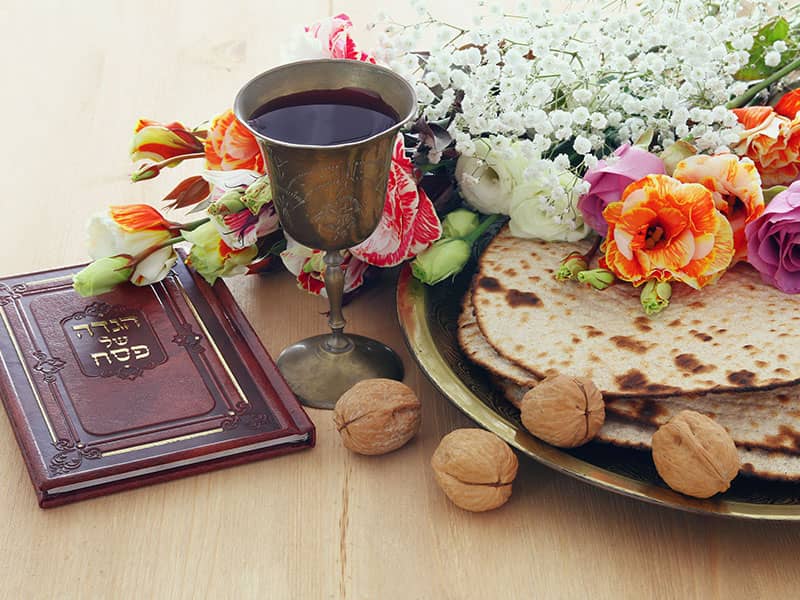 | |||
 |
 |
 |
 |
|
PLUS: Find more features, music, and the interactive seder plate in Beliefnet's Passover section.

There are other variations of these memories, depending on one's land of origin: North African Jews, for instance, do not make matzah balls, and Yemenite Jews make a point of dressing for the seder in traveling clothes to suggest that, like our biblical ancestors, they are ready to take off instantly to heed a divine call to the Holy Land. So for many, Passover has become a kind of ethnic memory, a warm feeling about the folkways of our ancestors.
Some of the nonbelievers who celebrate Passover, especially political liberals, make themselves comfortable by thinking of the holiday as the "festival of freedom." The Jewish slaves who broke out of Egypt are the paradigm for all enslaved people, so Passover is celebrated in the rhythm of a most moving spiritual of African-American music, "Let My People Go."
Another contemporary interpretation of Passover has been made on the other side of the Jewish political fence, by nationalists and ultranationalists. For them, Passover commemorates the defiance by Jews of those who oppress them, of victimized Jews finally finding the courage to traverse the desert and enter the promised land, to conquer it by fire and sword. I have no doubt that in many households, this Passover the words from the seder liturgy--"Pour out thy wrath upon the nations who knew Thee not because they have devoured Jacob [that is, the Jewish people] and destroyed his habitation"--will be recited with particular passion and anger at the ongoing Intifada being conducted by Arabs against Israel.
 | |||
 |
 |
 |
 |
|
PLUS: Find more features, music, and the interactive seder plate in Beliefnet's Passover section.

Yes, the Egyptians were very wicked, and the Israelites were slaves who had just been freed, but the rabbis of the Talmud had the courage to look at the biblical song of rejoicing and imagine God questioning and even disavowing it.
My father understood Jewish pain and anger. He had lived through several pogroms in his early years in Poland at the end of World War I. And yet, he always reminded us that even the most passionate biblical denunciation of the enemies of the Jews--"Erase the memory of Amalek!"--can be interpreted to be less angry than it seems to be. The people of Amalek attacked the Israelites almost immediately after they left Egypt. The sin of Amalek was that they were merciless; they fell upon the weakest stragglers from behind.
In my father's mind, the commandment to erase the memory of Amalek means that we should not learn from Amalek's example, that we should never repeat such behavior, even in retaliation.
He asked: Why did the Almighty choose a man who seemed so totally unsuitable? Moses had not even been raised among Israelites, for Pharaoh's daughter had plucked him from the water as a baby and raised him as her son.
 | |||
 |
 |
 |
 |
|
PLUS: Find more features, music, and the interactive seder plate in Beliefnet's Passover section.

To answer this question, my father expounded on what happened in Egypt during the ninth plague, when deep darkness enveloped the land. In the midst of the darkness, all the slaves took as much as they could of the wealth of Egypt as repayment for their years of suffering. While this was happening, Moses remembered a promise made by the Jewish people to their ancestor Joseph. They had promised that when they finally left Egypt, they would find Joseph's body and take it with them to bury in the promised land.
My father concluded: Moses had the merit to be God's messenger in redeeming the Jews because he was the person who accepted as his own a responsibility that actually belonged to all the people.
So why the strange fact that Moses' name is never mentioned in the Passover seder liturgy? It is not necessary because the whole of the seder is about the responsibility of each and every individual to keep the promise of justice and love that we have made to God--justice and love of everybody.
At my father and mother's Passover table, we were always feeding every hungry person we could find, and at that table we learned what the seder was about. It is not about historic angers. It is not about ideologies. It is about selflessness.

